Articles about reggae music, reviews, interviews, reports and more...
Sierra Nevada World Music Festival 2010

Sierra Nevada World Music Festival 2010
A weekend showcasing world music featuring reggae artists from Jamaica, Guayana, Trinidad, Israel, Italy, the United States and more.
Sampler
The Sierra Nevada World Music Festival began sixteen years ago with the simple idea that a group of “conscious music” lovers from around the world could come together and live in their ideal community for one weekend of the year. In this Utopia, love reigns supreme and the order of the day, all day everyday, is music. The most powerful leaders are Senegalese singers, Jamaican DJs and Nigerian drummers and the most significant social practice is dancing. All present people are represented and all needs are fulfilled. Differences are not only celebrated but attended to with tailored offerings. In their seventeenth year, with a line-up of artists from locations spanning the global conscious community, the festival organizers have evidently mastered the art of bringing something for everyone.
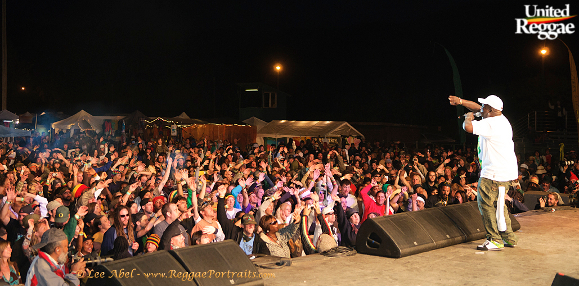
The festival began early on Friday evening but to me, there was one reason to race to Mendocino from Oakland after work hours on Friday: David Rodigan. It was everything I’d hoped it would be: A sea of all the vintage Dennis Brown, King Tubby and most extravagant dubplates on Earth. 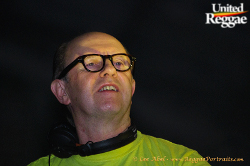 It was dozens of spellbinding boom tunes, which shall remain unnamed because they’re so ridiculously far over my humble head. It was just the way I think the dancehall ought always to be. Uplifting, empowering, joyful and educational. Rodigan did talk a lot, breaking to share a story or little known tidbit from days passed. He also had an interesting way of hyping the crowd, saying “Give me some signal for Alborosie,” or “Give me some signal for King Tubby.” Whether it was an extra shout, an extra wind or toke, the crowd in the converted livestock warehouse was brimming with signals of gratitude until just shy of three a.m.
It was dozens of spellbinding boom tunes, which shall remain unnamed because they’re so ridiculously far over my humble head. It was just the way I think the dancehall ought always to be. Uplifting, empowering, joyful and educational. Rodigan did talk a lot, breaking to share a story or little known tidbit from days passed. He also had an interesting way of hyping the crowd, saying “Give me some signal for Alborosie,” or “Give me some signal for King Tubby.” Whether it was an extra shout, an extra wind or toke, the crowd in the converted livestock warehouse was brimming with signals of gratitude until just shy of three a.m.
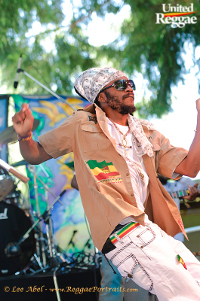 The next morning, we rolled back to the festival grounds just in time to catch Messenjah Selah’s She Ask Me Say in the Saturday morning sun. His was the first set of the day, and like any proper messenger he brought the good word loud and clear. Backed by an eight piece band with two back-up singers and a two-piece horn section, he careened into Your Own World a nice laid back jam with drawn out, sloping horn parts perfect for swaying between patches of sun and shade in the little grove of the festival’s smaller, Village Stage. Selah noted that “whoever is the president is always going to be a puppet” before launching into big tune Focus and continuing with Real Rasta and an unflinching exclamation that “the number one criteria for Rastafari is love.”
The next morning, we rolled back to the festival grounds just in time to catch Messenjah Selah’s She Ask Me Say in the Saturday morning sun. His was the first set of the day, and like any proper messenger he brought the good word loud and clear. Backed by an eight piece band with two back-up singers and a two-piece horn section, he careened into Your Own World a nice laid back jam with drawn out, sloping horn parts perfect for swaying between patches of sun and shade in the little grove of the festival’s smaller, Village Stage. Selah noted that “whoever is the president is always going to be a puppet” before launching into big tune Focus and continuing with Real Rasta and an unflinching exclamation that “the number one criteria for Rastafari is love.”
“I’m gonna represent livity, upliftment, liberation, and positive words that can inspire and motivate people to just do better within themselves. So that’s the vibes. If I could get someone to just think, I feel like that’s the way to create change. So that’s what I try to do with my music and my message,” said Messenjah Selah after his set.
With a new mixtape that dropped just hours before the first band hit that weekend, Guayana-born Jahdan Blakkamoore blessed the Village Stage just minutes after Messenjah Selah stepped down. (The festival ran extremely smooth just so throughout.) One of the standout shows of the weekend, he took the cake for cramming the most diverse set of stylings into an abbreviated festival set, not to mention a striking stage presence and fresh to death style. 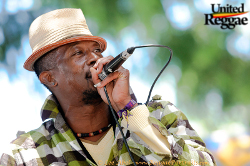 (The man rocked cargo shorts over blue jeans and looked damn good doing it.) One part reggae, one part dubstep and an indefinite number of parts for which there are no words just yet, Blakkamoore is captivating in his resistance to be trapped in a box. Exploring an evident glut of influences from reggae, dubstep, hip-hop and Afro-beat, you may catch him in a box for a minute, but don’t expect him to linger; he’ll be busy digging tunnels from one genre to another, marking his territory and then moving on for more. A SNWMF virgin, Blakkamoore praised the northern California reggae scene for it’s open mindedness.
(The man rocked cargo shorts over blue jeans and looked damn good doing it.) One part reggae, one part dubstep and an indefinite number of parts for which there are no words just yet, Blakkamoore is captivating in his resistance to be trapped in a box. Exploring an evident glut of influences from reggae, dubstep, hip-hop and Afro-beat, you may catch him in a box for a minute, but don’t expect him to linger; he’ll be busy digging tunnels from one genre to another, marking his territory and then moving on for more. A SNWMF virgin, Blakkamoore praised the northern California reggae scene for it’s open mindedness.
“I notice that the scene here [Northern California] is more open minded, because people are open to new things and open to exploring different artists and not only checking the artists from Jamaica alone. People are more open minded, they want something more real, they want something clean, they want conscious, and New York City is like, everybody is trying to meet up to the trend so much. They’re trying to be like cookie cutter and run of the mill,” said Blakkamoore.
Flaunting fluid versatility, he sang Jah praises on one-drop boom tune Mountains to Climb and then dove head first into hip-hop Rasta-chat rock jam Live From the Frontline from his group Noble Society. He also hit with the ultra funky Out of the Slaughter, Songs of Love, Down in the Ghetto (sampling Eek-A-Mouse’s Ghetto Living), Cash Flow and was joined at the end by his Village stage predecessor, the ever-fired-up Messenjah Selah.
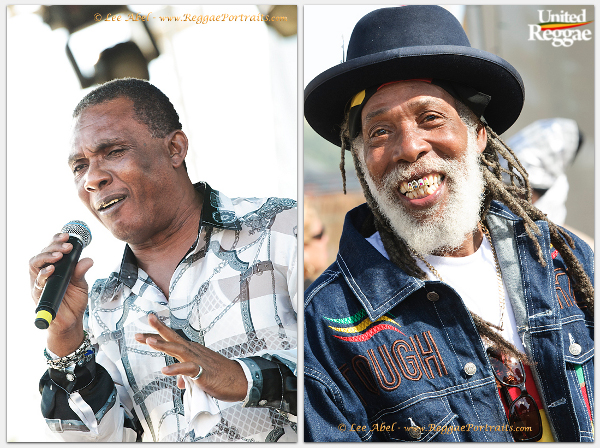
I made my way over to the bigger, Valley Stage to catch the second show of the day there, Ken Boothe, but was greeted by the unmistakable sound of the strictly roots DJ Big Youth, screeching on repeat, “If You Drink Don’t Drive!” I’m still not really sure why. Clearly on a crusade to be the first to wake the town of Booneville and tell the people, Big Youth, “always come to tell the truth,” charged through the rest of his set sliding across the stage hips first blasting a roots rock medley featuring Hit the Road Jack and What the World Needs Now.
Next on the Valley Stage was Ken Boothe, who opened with Dandy Livingstone original (People Get Ready) Do Rocksteady and offered up a great set for easy rocking, not raging, after swallowing the musical equivalent of venti-sized Cuban coffees (by the names of Messenjah Selah, Blakkamoore and Big Youth). When he sang When I Fall in Love, Boothe’s beautiful voice seemed to bounce to the summits of the little hilltops surrounding the valley and back.
Around 5:30 Alborosie rolled deep onto the set with his band, The Shengen Clan. Around this time I noticed David Rodigan, perched on a hay bail a few feet away. As Rodigan had gone out of his way the night before to speak volumes of the Sicilian star in the dancehall, it was nice to see that he rolled out to support in the crowd among us festival-going underlings. (In the reggae parish of this utopian community, Rodigan is royalty.) 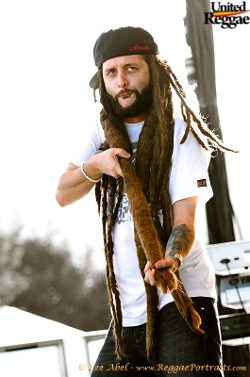 As this was the final date on the clan’s month-long tour, which both began and ended in Northern California, the Alborosie crew certainly had an ample warm up. The stars of the show were The Shengen Clan, boasting two of the most notable back-up singers/dancers/straight-up hot gals of a weekend chock full of fire. Running through the roster from a cool version of Money with a nice extra repetition of the word “money” in the typically three-word refrain, Waan the Herb with the Shengen Clan ladies standing out once again and an always awesome, sped-up live rendition of Sound Killa, the clan also did versions of Black Uhuru’s Stalk of Sensimilla and John Holt’s Police in Helicopter. The common, crowd-pleasing covers were too easy an out for a new artist that I think still has something to prove. Worth mentioning was Albo’s comment on the recent relocation of Rototom Sunsplash from Italy to Spain, citing that “The Italian government don’t like Rasta. They don’t like freedom.”
As this was the final date on the clan’s month-long tour, which both began and ended in Northern California, the Alborosie crew certainly had an ample warm up. The stars of the show were The Shengen Clan, boasting two of the most notable back-up singers/dancers/straight-up hot gals of a weekend chock full of fire. Running through the roster from a cool version of Money with a nice extra repetition of the word “money” in the typically three-word refrain, Waan the Herb with the Shengen Clan ladies standing out once again and an always awesome, sped-up live rendition of Sound Killa, the clan also did versions of Black Uhuru’s Stalk of Sensimilla and John Holt’s Police in Helicopter. The common, crowd-pleasing covers were too easy an out for a new artist that I think still has something to prove. Worth mentioning was Albo’s comment on the recent relocation of Rototom Sunsplash from Italy to Spain, citing that “The Italian government don’t like Rasta. They don’t like freedom.”
During what was the closest we came that weekend to a press and radio DJ circus centered around fresh-off-the-stage Alborosie, (during which I managed to piss off the guest of honor by inquiring about a connection between his sophomore album 'Escape from Babylon' and the Martha Velez album of the same name from the 70s which was produced by Bob Marley and Lee Perry), I had my sights set on Rodigan, who had slipped back stage at the end of the show presumably to give big ups to the artists who’s debut album he blessed by calling it “real authentic reggae music” on the intro track. While radio DJs, photographers and writers swarmed the “Soul Pirate” (his words, not mine) I had a chance to ask Rodigan just what he meant by his statement on the album.
“Real authentic reggae music is melodic, soulful, deep. It’s the kind of music you never forget, and when you hear the rhythm it sends shivers down your spine. And that’s real authentic reggae,” Rodigan said. In other words, it’s completely subjective and it doesn’t matter if you agree or disagree with his personal picks; authenticity is about what the music does to you and for you, personally. Way to hit the nail on the head, Rodigan! (I also had the chance to ask him about one particular tune he played that cast a spell on me in the dancehall during which I could not stop smiling. It was Dennis Brown’s Created by the Father, from his album 'No Man is an Island', which was released when Brown was just fifteen years old.)
During his press conference, Alborosie had a chance to respond to the same question, to which he said, “Authentic passion. My music is authentic passion. I don’t know if it is real authentic reggae music, but I just like to do my thing and hope for the best and keep my fingers crossed. But it is passion and love.”
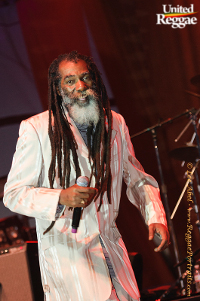 When Don Carlos stepped off his tour bus leaning on a cane, it looked like his might be a lower energy show, granted featuring some of my own personal first favorite roots tunes. As I’d hoped, he played a heap of songs from his album 'Lazer Beam', including Come In Girl, continuing with Ride on Christine, Hog and Goat, I Like It, Jamaican Woman, Johnny Big Mouth, and Dice Cup. He also pulled up a few tunes from his new album including Rude Boy (Go Easy). In a glistening, all white suit as the sun began to set, Carlos gave everything he had, which is to say a whole lot. From the minute he set foot on stage, Carlos was the opposite of the modestly meandering man who had made his way slowly from the bus. I guess he was preserving his power for a grand gesture of his undeniable love for us. Although he could have charmed the crowd on past merits alone (from nearly forty years in the business), his reluctance to take that free ride ranked his set among the highest heights of the weekend.
When Don Carlos stepped off his tour bus leaning on a cane, it looked like his might be a lower energy show, granted featuring some of my own personal first favorite roots tunes. As I’d hoped, he played a heap of songs from his album 'Lazer Beam', including Come In Girl, continuing with Ride on Christine, Hog and Goat, I Like It, Jamaican Woman, Johnny Big Mouth, and Dice Cup. He also pulled up a few tunes from his new album including Rude Boy (Go Easy). In a glistening, all white suit as the sun began to set, Carlos gave everything he had, which is to say a whole lot. From the minute he set foot on stage, Carlos was the opposite of the modestly meandering man who had made his way slowly from the bus. I guess he was preserving his power for a grand gesture of his undeniable love for us. Although he could have charmed the crowd on past merits alone (from nearly forty years in the business), his reluctance to take that free ride ranked his set among the highest heights of the weekend.
The next morning we were a little late for Sunday morning “church” at the Village stage but were still warmly welcomed by Queen Makedah’s Israel-infused gospel over robust reggae rhythms. Followed by the legendary Lloyd Brown’s straight lover’s set, they were the perfect two acts to lead a communal thanks giving in the sun on the final morning of fest.
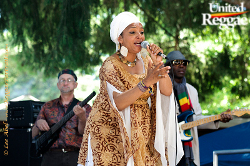 The Bay Area-based Queen Makedah and The Sheba Warriors band did their collective thing performing rootsy compositions iced with throaty, gospel vocals. Makedah and her impressive all-star band really embodied the spirit of the Sierra Nevada World Music Festival; conscious music artists and projects representing influences from all corners of the globe, simmering together on a common ground and bubbling over with all-goodness. At one point, during a Hebrew blessing about a king and his wisdom, the guy next to me grinned that his mother “would love this.”
The Bay Area-based Queen Makedah and The Sheba Warriors band did their collective thing performing rootsy compositions iced with throaty, gospel vocals. Makedah and her impressive all-star band really embodied the spirit of the Sierra Nevada World Music Festival; conscious music artists and projects representing influences from all corners of the globe, simmering together on a common ground and bubbling over with all-goodness. At one point, during a Hebrew blessing about a king and his wisdom, the guy next to me grinned that his mother “would love this.”
When Lloyd Brown hit the stage backed by Bodhirock, a nine piece band of fresh faced California youths from L.A., the crowd continued to lap up the late morning love. His set featured a participatory performance of Bob Marley’s One Love featuring Brown humming a rhythm and bass line as the crowd sang the words. 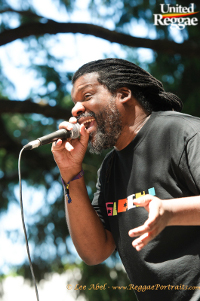 Breaking out from his lover’s vibe, Brown busted into an impressive vocal dub beat-box tune during which the crowd jammed down and rocked back with approving laughter and smiles. He moved on to a Marley medley, which kicked off with a Get Up, Stand Up, progressed into Exodus and wrapped up with I Shot the Sheriff just as Brown shook down his locks and worked it out. Twenty-seven years in the business, and I’m happy to report that Brown’s still got it. Definitely deserving of a shout out were Brown’s backing band, Bodhirock, featuring two fantastic, corset busting back-up singers and a tight but splendidly slippery three-piece horn section.
Breaking out from his lover’s vibe, Brown busted into an impressive vocal dub beat-box tune during which the crowd jammed down and rocked back with approving laughter and smiles. He moved on to a Marley medley, which kicked off with a Get Up, Stand Up, progressed into Exodus and wrapped up with I Shot the Sheriff just as Brown shook down his locks and worked it out. Twenty-seven years in the business, and I’m happy to report that Brown’s still got it. Definitely deserving of a shout out were Brown’s backing band, Bodhirock, featuring two fantastic, corset busting back-up singers and a tight but splendidly slippery three-piece horn section.
“Here in California, one thing that has basically sustained throughout is the love for roots music and reggae music. But with me, I’m trying to bring something different to it, where I bring love as well, not sickly kind of love or a sweet kind of lover’s vibe, but just love that is there between a man and a woman, which no one can doubt or deny. So just trying to bring that as well but keeping it solid and grounded, and singing songs of love and songs of lust as well,” Brown said after his set.
Rootz Underground graced both the Village and Valley stages, first on Saturday night and then Sunday afternoon. 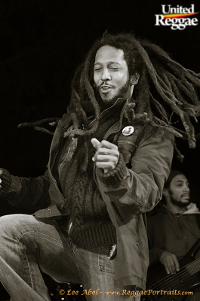 Admittedly, I don’t know this band and had a hard time taking notes on their tunes since they lack the repetitious choruses of many of the other reggae acts on the bill. They were definitely a favorite among lots of loyal fans and it was easy to see why; they were infectious, hard-edged and ultra high energy. They had the rebellious vibe of Rage Against the Machine layered in fine balance with the melodic layers of Midnite. And I’m pretty sure Stevie G (the lead singer) has superpowers. But don’t quote me on that. They don’t have a horn section but they don’t really need one, (although my New Orleans sensibilities tell me there’s no situation not suited for horns), and once they reached their musical climax, they kept the high-flame fire burning till the end. One song I did manage to recognize was the apparently big tune Power to the People, which I only knew because of its familiar “No Vacancy” riddim from Sugar Minott’s number of (I think) the same name.
Admittedly, I don’t know this band and had a hard time taking notes on their tunes since they lack the repetitious choruses of many of the other reggae acts on the bill. They were definitely a favorite among lots of loyal fans and it was easy to see why; they were infectious, hard-edged and ultra high energy. They had the rebellious vibe of Rage Against the Machine layered in fine balance with the melodic layers of Midnite. And I’m pretty sure Stevie G (the lead singer) has superpowers. But don’t quote me on that. They don’t have a horn section but they don’t really need one, (although my New Orleans sensibilities tell me there’s no situation not suited for horns), and once they reached their musical climax, they kept the high-flame fire burning till the end. One song I did manage to recognize was the apparently big tune Power to the People, which I only knew because of its familiar “No Vacancy” riddim from Sugar Minott’s number of (I think) the same name.
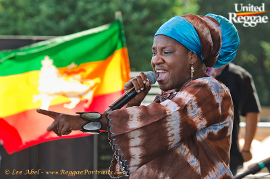 I managed to catch four tunes from Queen Omega, the proclaimed “Queen of Reggae” of Trinidad. With ladies like Marcia Griffiths around I wouldn’t go so far as to say she’s the reigning queen of all the reggae kingdom, but she’s definitely pretty royal. She blasted the crowd with renditions of tunes like Ganja Baby and Judgement, exclaiming, “Can’t stop spit fire pon Babylon!” And spit fire she did, straight through until it was Jimmy Riley time.
I managed to catch four tunes from Queen Omega, the proclaimed “Queen of Reggae” of Trinidad. With ladies like Marcia Griffiths around I wouldn’t go so far as to say she’s the reigning queen of all the reggae kingdom, but she’s definitely pretty royal. She blasted the crowd with renditions of tunes like Ganja Baby and Judgement, exclaiming, “Can’t stop spit fire pon Babylon!” And spit fire she did, straight through until it was Jimmy Riley time.
Jimmy Riley and his lover’s set on that bright Sunday afternoon were deliciously calming, giving just the right bit of energy to keep the fire burning without wearing us out. 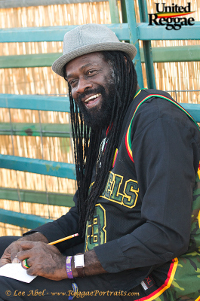 His son, the currently gigantic Tarrus Riley, played on a bill with Cocoa Tea, Barrington Levy and Michael Rose in Oakland back in February and it was a treat to see the older generation still holding it down. Launching into his big tune from the 80s, Put the People First, he slid into a cover of pop-country hit Baby I’m Amazed By You which frankly, I could have done without. Following another less than stellar cover choice of Love the One You’re With, Mr. Riley rapped a bit to the crowd:
His son, the currently gigantic Tarrus Riley, played on a bill with Cocoa Tea, Barrington Levy and Michael Rose in Oakland back in February and it was a treat to see the older generation still holding it down. Launching into his big tune from the 80s, Put the People First, he slid into a cover of pop-country hit Baby I’m Amazed By You which frankly, I could have done without. Following another less than stellar cover choice of Love the One You’re With, Mr. Riley rapped a bit to the crowd:
“There are so many nice ladies out here to love! And if you don’t have your own, well…Maybe you can borrow one,” he mused.
Wait, what? But he did redeem himself later when he niced up the place with a nostalgic Love and Devotion, and alas, all was right again.
After a weekend dominated by men, there was no one more fitting to close out the experience than Ms. Marcia Griffiths, whose presence alone was a treat.
The actual closer was Barrington Levy, who I unfortunately had to miss. But I did hear from a trusted source, the one Lee Abel, that Barrington was, not surprisingly, very well received. I should note that I could have, with confidence, written a glowing review of Mr. Levy’s set at SNWMF because when I saw him just a few months ago his voice was sharp as tacks, energy high as the most, and his command over the crowd was exceptional.
Ms. Griffiths started out at a young age working with the likes of Jamaica’s immortal producer Coxsone Dodd, and has been around every block since. But up on stage that Sunday, she proved she is far from slowing down. Her roots and rocksteady set was sprinkled with tight replications of classic dancehall riddims from the kinds of dances I’ve only dreamt of, and her grace and power were unparalleled. 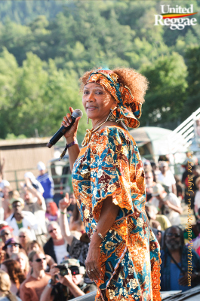 There was no doubt that as promised, she shall, indeed sing as long as she lives; boasting both her own respective big tunes and giving a nod to those of the new reggae set. She tipped her hat to the younger generation of musical youth by scatting her way through Stephen Marley’s familiar hook from Traffic Jam, and by performing a handful of moving duets with her son, (whose name unfortunately escaped me but is a force worth watching for in the coming years) including a spine tickling Live On during which said son played the role of Beres. She continued giving big ups to artists from Junior Gong to Eek-a-Mouse through little snippets of tunes like Welcome to Jamrock and Wah Do Dem also shouting out to the women in the business which she called “no longer male dominated, it’s fifty-fifty.” Channeling the vibes of a summertime secondline or a block party punctuated with a big-ass soundsystem, I had more fun busting a wine to tunes like I Feel Like Jumping, and Toots’ 54-46 than I’d had all weekend. When she burst into Bob Marley’s evergreen Could You Be Loved, I broke a sweat in the shade and lost my breath for the first time, too. And yes, in the “something for everyone” spirit of Sierra Nevada World Music Festival, she even did the Electric Slide. Something for everyone, indeed.
There was no doubt that as promised, she shall, indeed sing as long as she lives; boasting both her own respective big tunes and giving a nod to those of the new reggae set. She tipped her hat to the younger generation of musical youth by scatting her way through Stephen Marley’s familiar hook from Traffic Jam, and by performing a handful of moving duets with her son, (whose name unfortunately escaped me but is a force worth watching for in the coming years) including a spine tickling Live On during which said son played the role of Beres. She continued giving big ups to artists from Junior Gong to Eek-a-Mouse through little snippets of tunes like Welcome to Jamrock and Wah Do Dem also shouting out to the women in the business which she called “no longer male dominated, it’s fifty-fifty.” Channeling the vibes of a summertime secondline or a block party punctuated with a big-ass soundsystem, I had more fun busting a wine to tunes like I Feel Like Jumping, and Toots’ 54-46 than I’d had all weekend. When she burst into Bob Marley’s evergreen Could You Be Loved, I broke a sweat in the shade and lost my breath for the first time, too. And yes, in the “something for everyone” spirit of Sierra Nevada World Music Festival, she even did the Electric Slide. Something for everyone, indeed.
Read more about this topic
Read comments (1)
| Posted by Captain Carpenter on 07.30.2010 | |
| Music rules the world, love feeds the soul, happiness keeps flowing like a river. Please never stop. Let the music keep playing. | |
Comments actually desactivated due to too much spams
Browse by categories
Recommended Articles
Latest articles
Recently addedView all
© 2007-2026 United Reggae. All Rights Reserved. Reproduction in whole or in part is prohibited. Read about copyright
Terms of use | About us | Contact us | Authors | Newsletter | A-Z






















































